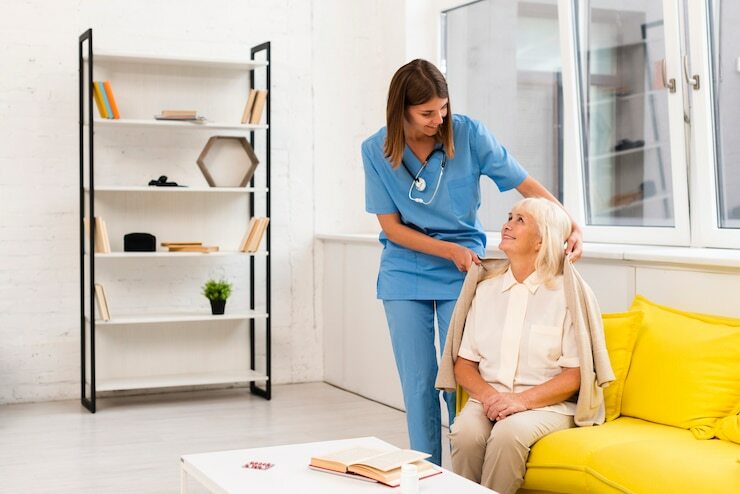Home healthcare services are becoming increasingly popular, especially when patients require long-term care, rehabilitation, or palliative treatment. Home nurses, equipped with the right skills, knowledge, and experience, play a vital role in managing medical needs in a home setting. But how do home nurses handle emergencies? This article explores the crucial responsibilities and actions home nurses take in managing emergencies while ensuring patient safety and well-being, with a focus on Home Nursing Services in Dubai.
Immediate Response in Emergency Situations
When a patient faces a medical emergency, home nurses must react promptly and efficiently. The first step is assessing the situation by evaluating the severity of the emergency. Home nurses are trained to remain calm and focused under pressure, allowing them to make quick, informed decisions. Their immediate actions may involve performing first aid, monitoring vital signs, and assessing the patient's breathing, pulse, and consciousness level.
Administering Emergency Care
Home nurses are skilled in providing emergency care, which may include stabilizing a patient before professional medical help arrives. Depending on the emergency, this could involve CPR (Cardiopulmonary Resuscitation) for patients who experience cardiac arrest, controlling bleeding from a wound, or managing respiratory distress. They are trained in the appropriate techniques to provide life-saving interventions until further medical attention is available.

Coordinating with Medical Teams
One of the most crucial roles of home nurses in an emergency situation is their ability to communicate effectively with the patient's broader medical team. Home nurses keep track of medical records and ensure that the emergency response aligns with any ongoing treatments or conditions. In case of a serious emergency, they will alert emergency services, family members, and any specialists involved in the patient’s care. This collaboration is vital to ensure that the patient receives seamless, coordinated care during an emergency.
Monitoring and Stabilizing the Patient
Once emergency care has been administered, the next priority for home nurses is stabilizing the patient's condition. This often involves continuous monitoring of the patient’s vital signs, such as heart rate, blood pressure, oxygen levels, and body temperature. In cases of chronic conditions like diabetes or heart disease, nurses must also monitor specific symptoms related to those illnesses. They are trained to notice early warning signs of deterioration and act quickly to prevent further complications.
Preventing Future Emergencies
Prevention plays a key role in reducing the frequency and severity of medical emergencies. Home nurses help patients manage chronic conditions through education, lifestyle adjustments, and regular monitoring. For example, a nurse might educate a diabetic patient on how to manage blood sugar levels effectively to avoid emergencies like diabetic shock. Nurses also provide advice on fall prevention for elderly patients or those recovering from surgery, reducing the likelihood of injuries that could lead to medical emergencies.
Maintaining Calm and Compassionate Care
During emergencies, it is crucial for home nurses to remain calm, not only for the patient's safety but also to provide emotional support. The patient and their family might be anxious, scared, or overwhelmed, and a nurse’s ability to offer reassurance and a calm demeanor is essential. A compassionate approach helps foster trust and confidence, ensuring that the patient feels cared for and supported during the emergency response.
Documentation and Reporting
After the emergency has been handled, home nurses are required to document their actions thoroughly. This includes noting the patient’s condition before and after the emergency, any interventions or medications administered, and the communication with other healthcare providers. Accurate documentation ensures that all parties involved in the patient’s care are fully informed of the emergency and the steps taken, allowing for proper follow-up care and treatment.
Benefits of Having a Home Nurse During Emergencies
Having a professional home nurse on hand to handle emergencies offers several significant benefits. Nurses bring expert knowledge of emergency procedures, ensuring a quick response to urgent situations. Their presence offers peace of mind to patients and their families, knowing that someone is capable of managing emergencies in a safe, professional manner. Moreover, home nurses understand the patient’s medical history, enabling them to provide more personalized and effective care during emergencies. This familiarity also makes it easier for nurses to anticipate potential risks and prevent emergencies before they arise.
FAQs
1. What is the first thing a home nurse does in an emergency?
The first step is assessing the situation to determine the severity of the emergency and begin immediate interventions, such as providing first aid, stabilizing the patient, and monitoring vital signs.
2. Can home nurses administer CPR during an emergency?
Yes, home nurses are trained in CPR and can perform it to help stabilize patients in cases of cardiac arrest until further medical help arrives.
3. How do home nurses communicate with doctors during emergencies?
Home nurses promptly alert doctors and emergency services, providing necessary details about the patient’s condition, treatment provided, and any ongoing needs.
4. Do home nurses provide ongoing care after an emergency?
Yes, after an emergency, home nurses continue to monitor the patient’s condition, assist with recovery, and prevent future emergencies by following up on treatment and offering advice on managing chronic conditions.
5. Can home nurses handle all types of emergencies?
Home nurses are trained to manage many types of emergencies, but in critical or life-threatening situations, they will immediately call for medical professionals and emergency services to provide specialized care.
Conclusion
Home nurses are trained professionals who play an indispensable role in handling medical emergencies. With their quick thinking, medical expertise, and calm demeanor, they ensure that patients receive the best possible care in the comfort of their own homes. Whether it’s providing immediate interventions, coordinating with other medical professionals, or offering emotional support, home nurses ensure that every aspect of an emergency is managed with precision and compassion. With their assistance, patients and their families can feel confident knowing that help is always available, even in the most critical situations.
